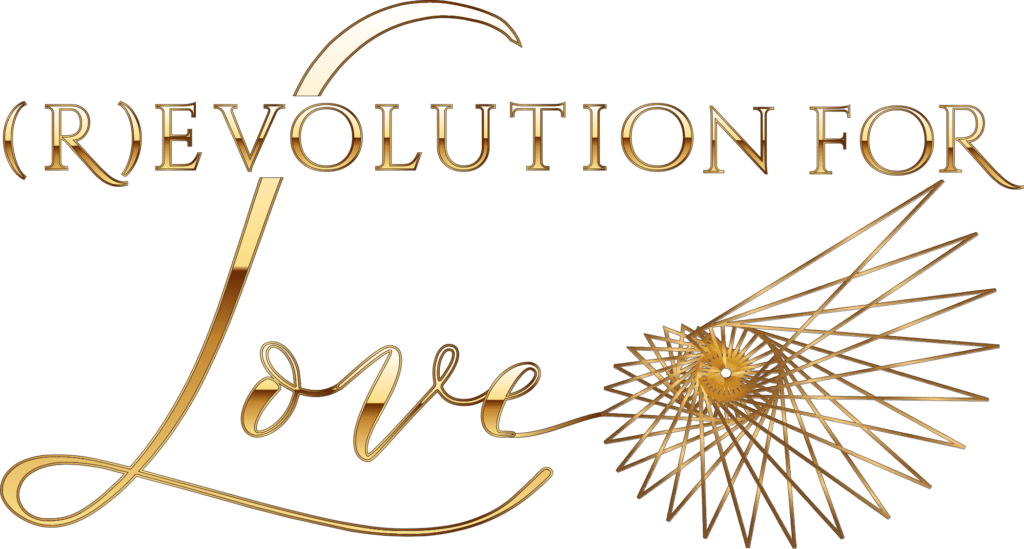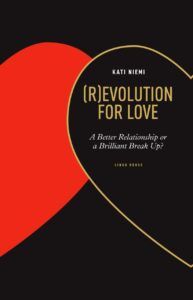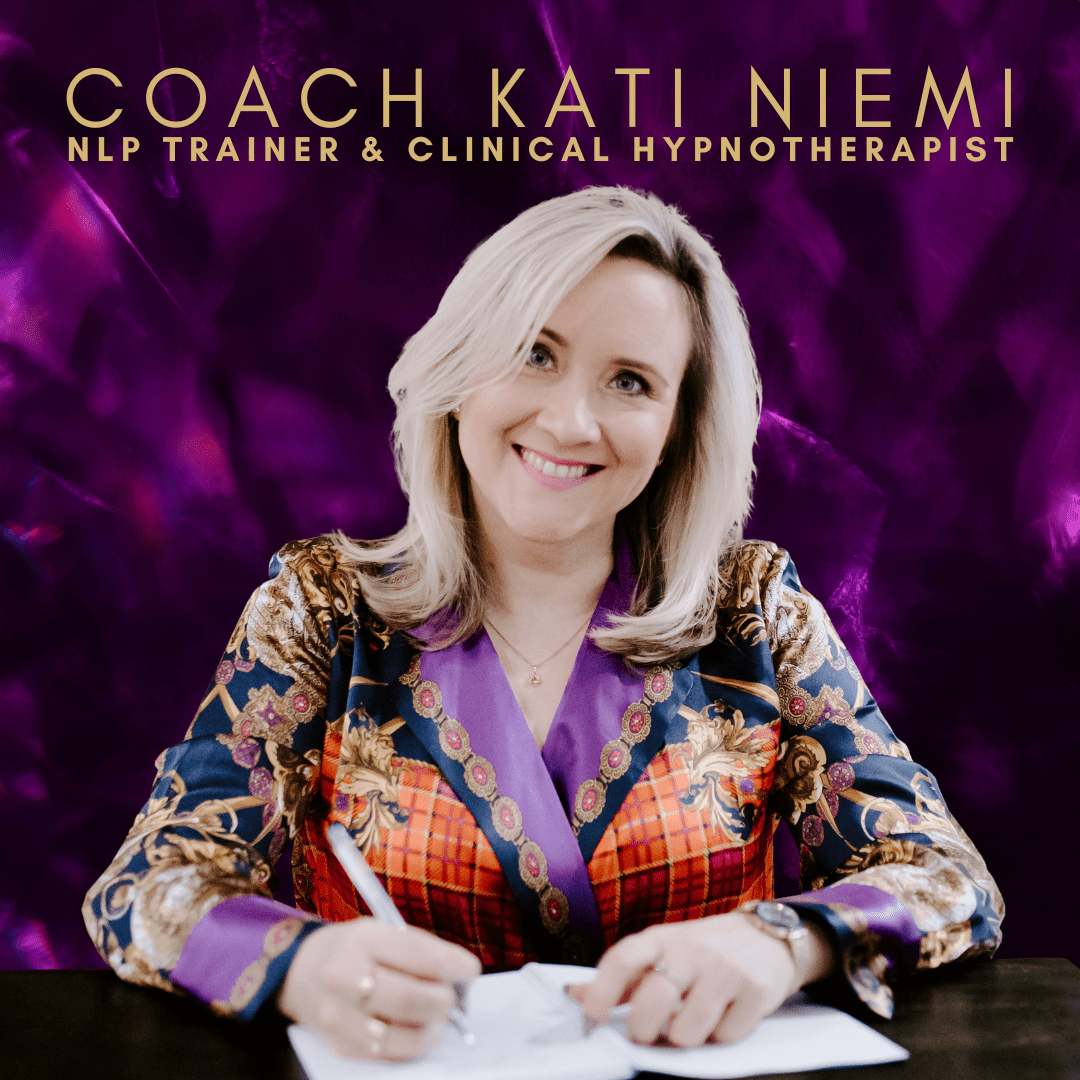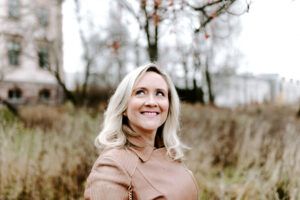Many philosophers and artists have attempted to describe what love is. As if it were something outside us, something that can be observed or analysed. Real love is a unique feeling and, like other feelings, everyone feels love differently. Genuine love is born within us, even if we tend to focus on the object of our feeling when we are in love.
This might lead us to think that it is the other person who has given us this great feeling of love. Every emotion we have is innate to us. This means you cannot push or make someone to love.
No matter how hard you try.
"While you will want to go through a lot of trouble to please your loved one, love shouldn’t feel like a chore. Love is not a union of two workhorses who struggle through their plight on sheer willpower."
Kati Niemi's book (R)evolution for Love - A Better Relationshp or a Brilliant Break Up?
What is love? And what is great, genuine love at its best?
In this long article on love, we will delve deep into all these most asked questions about love:
- Why does love throw us off balance and make us a bit crazy?
- Does falling in love mean you have to have sex?
- Why does falling in love sometimes feel wonderful and sometimes so hard an excruciatingly painful?
- What is love at the different stages of relationship?
- What different forms can love take?
- What is love like in an open relationship?
- Is romantic love necessary in a long relationship?
- How to genuinely love ourselves?
- Can there be genuine love in a relationship if it is never shown in concrete terms?
- Where does love go when there is an argument?
- How can I make my partner lover me more?
- Can I learn to love my partner again if my trust has been betrayed?
- Is jealousy just strong, genuine love?
- Where does the initial romance disappear and how to keep the fire burning in a relationship?
- Should you have children with the person you have just fallen in love with?
- How to keep the love alive in a long-distance relationship?
- If we break up, does it mean our love had died?
What do you agree to in a relationship just because “it is part of being in a relationship”...?

Is the most important thing in a relationship love? Sex? Intimacy?
What is the most important thing in a relationship? What can you expect from your partner? Does there have to be sex in a relationship?
We are used to assuming that a relationship involves certain things. This leads to feelings of disappointment or anger as the things we find importance are not treated as a priority in your relationship.
Have you ever thought about what the most important thing for you is in a relationship and is that need fulfilled in your current relationship? Have you agreed to have sex with you partner although you didn’t really want to but that’s what couples do?
Read more about how to determine the content of your relationship and the useful Relationship Smorgasbord model!
Love ebbs and flows within us, at our own pace. Real love transforms itself and its objects throughout our lifetimes. That’s why it is possible love many people at once, deeply and yet in so many different ways. Because love is something in us, love does not really die or disappear as others change or leave our lives.
Real love is always there. In us.
Real love defies words
Sometimes when I’m asked, what is love, I say nothing. I am speechless (for once!) in the face of that question.
Love is too big, too deep, too colourful to be described or contained in a phrase. Limiting love to what word can express feels wrong, plain and simple. It is like deflating the meaning of love.
My job is not to describe how you feel, because I can never feel what you feel. I can only try and describe what love is to me and the phenomena that have been scientifically identified. These include changes in our brain chemistry and body when we fall in love.

However, I do get asked about love a lot. I can only attempt to give an answer, which will inevitably be as complex and elusive as love itself. I have gathered some of those thoughts in this blog.
Since genuine love is something that lives in us, and we are constantly changing with time and with experience, what I write under this theme may also change over the years. Maybe you will come back to this blog one day and read it and understand it quite differently from now.
When we read a book, we seldom pay attention or hear the same things during the first reading as we do on the second.
Every subsequent reading of a text is always different. A man once told me he had been reading the same book every day since the 1970s and every day he discovered a new gem to refresh his thinking. And that book was not the Bible – in case you were wondering.
As I’m writing this blog, I’m hoping that you think carefully about what I’m saying and ask yourself as you read on: What does love mean to you? Right now, at this stage of your life?
Today.
Sometimes we deny ourselves the feelings of love in a secret affair or that we still have feelings towards our partner after we have broken up.
Our lives keep changing and yet we don’t want our feelings of love to change as we move on, say, from our happy single days to feeling profound love towards our partner and children.
Or we have difficulty accepting that a love we felt as a couple should changes into love we feel towards a friend or a fellow human being.
Sometimes we deny ourselves the feelings of love in a secret affair or that we still have feelings towards our partner after we have broken up.
Let your love live – to develop and evolve. The transformation is the only fertile soil that love needs to flourish and reach new dimension and grow deeper roots.
Is denying love ever good for ourselves or others?
What is love in its various forms?
There are many types of love. Real love is not limited to a specific format or duration of a relationship or ways of expression. After you have finished reading this long article about love, read some of my other blogs below to find out if a secret affair or a one-night stand could bring life to a long relationship. The blog also talks about what it is like to live in an open relationship or a long-distance relationship:
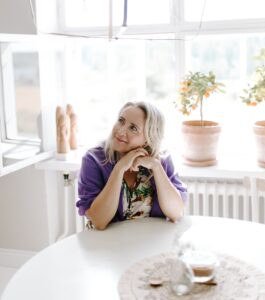
Can secret affairs and one-night stands keep a relationship alive?
The love and passion in a secret affair can be the most amazing thing to experience. What reason is good enough to have a secret affair?

Open relationship – just an option among many others?
What is an open relationship? What could we all learn from them? Do people in open relationships not experience jealousy?
Love between friends can be more real and honest that romantic love. In a long relationship, romance is certainly a good thing but quite often couples turn into “just” friends who love each other. Some are perfectly happy in such as relationship for the rest of their lives, and others can’t settle for a friendship instead of a relationship in which romance and eroticism thrive till the very end.
Neighbourly or brotherly love is love we feel towards any other human being, be it your ex or the nice lady next door. Besides charitable deeds, we can also express neighbourly love through everyday encounters at work, at the supermarket, walking on the street, just by smiling and saying hello. Sometimes when we are feeling competitive, we forget neighbourly love, and take offence if people don’t stay in their own lane, whether in the local swimming pool or on the road.
It is difficult to give real love if you are not used to receiving it.
We love our children as mothers and fathers. Love is what makes parents look after their children and each other, if only because they share a child that they both love. We love our family: brothers, sisters, aunts and uncles.
Love and showing love are associated with culture-bound customs, such as marriage rituals, but ultimately love is always an inherent feeling felt by all human beings. We can love our country as the country where we were born in, its language, traditions and customs.
As we can see, real love takes many different expressions. The format or duration of a relationship does not define the amount of love we feel.
What is real love towards ourselves?
Love is something we feel towards others but also towards ourselves.
To be able to love another person without being excessively needy, we need to learn to love ourselves first. Real love towards ourselves is based on healthy self-awareness, which in turns supports self-image and self-esteem. To find out more about these themes, read my Wellbeing blogs, such as:

How to improve your wellbeing through self-development?
Science has revealed: some adults are not mentally sufficiently developed. How to improve your wellbeing through self-development?

When positive thinking becomes toxic
What is too positive thinking like? Where should we focus the power of our mind and our willpower?

How to improve self-esteem through social media?
What is good self-esteem? How to improve your self-esteem through social media? 7 steps to help you improve self-esteem!
When you know yourself well, you will also know that in addition to your “negative side”, you also have plenty of assets, beauty and fun in you. Those are aspects that are easy to love, right?
However, it is also important love everything about oneself, despite the “negatives”. Accepting yourself as a whole, living being does not mean you don’t benefit form identifying the areas you could improve or practicing better ways of thinking and acting.
Quite the opposite.
Genuine love towards ourselves is an incentive to look after ourselves throughout our lives, through all the ups and downs.
How to you speak to a dear friend?
And how do you speak to yourself?
How do you show affection to your beloved?
How do you show affection to yourself?
Can there be love in a relationship even if it is not shown in concrete terms?
Loving can be gentle and fierce and anything in between, love is never just an abstract feeling.
Real love lives in the encounters, acts, words, gestures. Love is a value that we express towards people who matter to us. People also love and look after their pets. Show love. Love is still love even if you do not show it through actual deeds or words.
However, in a long relationship, showing love is essential. Showing love does not have to mean whisking your partner off to romantic mini breaks, although it can be this as well. Showing love is not the same as a public display of affection and love is not measured by the number of happy couple pictures posted on social media.
Love is not hard work although you are happy to go through trouble to please your loved one.
Love relationship is not a job for which you are paid in smiles and affection.
While it is a good idea to show your love with concrete action and by responding in kind to affection, real love is never used as currency.
Real love does not disappear because you argue. Only you can stop loving.

FREE EBOOK ‘I love you but…’ – To Break Up or Not to Break Up?
Refocus your energy now to improve your love life! This FREE ebook ‘I love you but…’ will help you move towards a better relationship or

SIGNS OF A BREAK UP: How to tell if my partner is going to leave me?
What are the typical signs of a breakup? How to spot the signals of an imminent separation or divorce? Is my partner going to leave me?
Sometimes love means letting go.
Love can be quiet and delicate – still almost every relationship comes with disagreements. That you voice your opinions and defend your needs and hopes and stand up to your partner’s opposing will does not mean that your love flies out of the window.
Real, genuine love is particularly powerfully present in situations where both have the courage to be themselves and act for themselves – even if this means disagreement. No matter how stupid or silly you are in that moment.
The opposite of love is indifference.
It is ok to fight with your partner and to love them – the two do not cancel each other out. The opposite of love is indifference. Genuine love is having enough hope and trust to resolve the issues that irritate you in your partner, with your partner. Not hiding in the arms of a secret lover or escaping for a brisk run to vent your anger.
However, never treat your partner as a bottomless bucket into which you can offload all your venom and bad feelings. It is up to us to look after our own wellbeing – and in this a brisk run is an option :-).
Letting go of your own needs for the benefit of your partner could be the biggest expression of love, but don’t make the mistake of sacrificing yourself on the altar of love. Equal love relationship gives a lot to both. If you are always the giver, you will live a life of want and need, and not just in your romantic relationships.
Genuine, real love is a personal feeling that cannot be copied or forced
Because love, like any other feeling, are innate, the feeling of falling in love does not require a response from the object of those feelings. You may already be utterly, head over heels in love with your new date and they might feel completely different. Since your feelings are separate, felt only by yourself, another person can’t copy your feeling or force that feeling.
And you can’t force a person to feel something.
Because love emerges in us at its own pace, infatuation changes into being in love and then into deeper sense of loving in ways and at a pace that is unique to each person and each relationship. That’s why love can manifest itself in many different way at different stages of a relationship – or not manifest itself.
What is love like at different stages of a relationship?
Real love does not need the boundaries of a relationship and, conversely, people are not always in a relationship for real love – sometimes not even a trace of love.
A long relationship consist of many different stages
Before relationship even exists or you could talk about love yet, there is usually infatuation and attraction. When another person starts to interest you as more than just a nice, fun person, your thoughts begin to circle around this fascinating person. You will see them in a new light, and in a crowd, your eyes are drawn to them. You spot them automatically because your mind unconscious mind is processing love even when your conscious mind is trying to focus on a task at hand or whatever it is that you’re doing.
You want to be able to see them, to talk to them, to listen to them talk. You look them in the eye and smile. They smile back. If the attraction is mutual, it is evident in the behaviour, looks, gestures and speech of you both.
Your hormones are racing and your neurotransmitters are making you feel euphoric.
When the brain is in the middle of the storm of falling in love, you may seem distracted and forget basic things. Nothing seems more important than the object of your infatuation and the funny feeling inside that is growing stronger and stronger: you’re in love.
What else is love besides hormones and neurotransmitters? Most importantly, love is an intoxicating feeling – especially in the early heady days. According to studies, the first wave of being in love lasts a couple of years, until the physical brainstorm subsides. Being in love changes into love.
After the initial whirlwind of emotion, couples reach a calmer sense of intimacy. The sense of attachment is less anxious and more relaxed. Obsessive feelings and behaviour that may have seem ludicrous to others give way to a more normal and peaceful existence.
Why does love bewilder us and make our heads spin?
From the evolution perspective, love is a biological hormone cocktail the sole purpose of which is to make people mate and procreate. Love deliberately throws our minds into a tailspin so that we would not stop to analyse for too long which of all the potential candidates would be best for us in the long term. We jump into bed because it’s great fun and because we are biologically hardwired to do so. It’s always worth having babies even if the partner isn’t ideal. Just throw caution to the wind and mess up those sheets.
Instead of rational thinking, there are quite animalistic factors behind the hormonal storm caused by falling in love, such as our personal body odour and pheromones. The physical compatibility of two persons is important, so that their offspring would by be as viable as possible from the perspective of evolutionary biology.
Pure physical appeal and real, genuine love
You may be familiar with the feeling when someone’s pure physical appeal is irresistible and how the presence of someone or their casual touch makes you weak at the knees. You are human, after all.
Because of their psychobiological changes in the brain chemistry, a person in love does not feel hungry as easily and feels energetic with very little sleep. The part of the brain known as the reward centre maintains a pleasant dopamine cycle despite the lack of sleep. Dopamine is an important neurotransmitter responsible for arousing motivation and keeping depression at bay. A person in love never into apathy and life is good!
Genuine love is much more that the heady cocktail of brain chemicals. However, it is probably important for most of us that we get to feel not only deep companionship and mutual appreciation but also passion and romantic love in a long relationship.

Can secret affairs and one-night stands keep a relationship alive?
The love and passion in a secret affair can be the most amazing thing to experience. What reason is good enough to have a secret affair?
Why does falling in love sometimes feel so difficult and painful?
At the early stages of falling in love, our thinking is confused by not only dopamine but also serotonin and cortisol. Although falling in love can feel intoxicatingly beautiful, it is in reality a stress on our bodies in physiological terms.
Under stress, our field of vision narrows down, as our only goal is to free ourselves from discomfort, that is, to fly into the arms of our lover. All else becomes meaningless. Your friends may have told you that glow like you’re in love or that we look ridiculous when we are in love.
The chemical storm in our brain makes us take risks such as leaving a bad relationship for a new, fantastic relationship with a dream lover or to move to the other side of the world to be with the person we love. Taking risks is not always a negative thing. Risks also involve the possibility of a positive outcome. The breadth of your field of vision determines what sort of options you see for your love.
While the first attraction and falling in love fills you with a tremendous sense of pleasure and lust, it is not pure euphoria. The uncertainty of losing the object of your feelings also causes insecurity, fear and jealousy.
Is jealousy real love? Is being jealous a sign of genuinely strong love?
Does genuine love also involve feelings of jealousy? Of course! Jealousy is just a feeling just like any other. However, jealousy is not a sign of how deep your love is or even how valuable or lovely that other person is to you. Sometimes jealousy is a sign of nothing more than selfishness and low self-esteem.
Don’t fool yourself thinking that a person who is jealous must really love you, because that is not necessarily the case. However, feeling jealous does not mean that you don’t genuinely love the other person. Love and jealousy are not mutually exclusive.
Because evolution drives us to make babies, fuelled by love, and because it’s useful in terms of childcare to have both parents around to look after the offspring. Evolution has made us want to couple up and form mutual attachment for at least long enough for the children to reach viability.
Today, the means of coping with situations are different than millennia ago. Our brains and biological makeup have not developed at the same pace as the modern technology that the Western civilisation relies on.
Our lizard brain and genuine love
Our “lizard brain” is significantly older in evolutionary terms that our more developed brain. Even today, every foetus develops a “lizard brain” before the cerebrum and the cortex, which focus on the cognitive performance.
This is why our emotional spectrum is still primitive. In evolutionary terms, it serves us well to try and ensure the wellbeing of our offspring and feel jealous of a partner, even if they are a bit of a good-for-nothing.
The urge to defend our children and ourselves makes us feel unpleasant feelings, such as jealousy. As your partner does not technically cause a single feeling in you, you are responsible for all your feelings, including jealousy. Even if your prehistoric lizard brain drives you to feel insanely jealous, remember that you are not an ape.
If your behaviour falls short of being rational, wake up your cortex to help you find reason before you cause harm to yourself, your partner and your child.

JEALOUS PARTNER: Does your partner’s jealousy drive you mad?
When your partner’s jealousy is getting too much, what could help? What to do when a jealous partner takes the joy out of your relationship?

Narcissism in a Relationship: “How to Know if My Partner Is a Narcissist?”
What are the signs and causes of narcissism? Can you make a relationship with a narcissist work? Can you heal a narcissistic partner?
Is romantic love necessary in a relationship?
Art is full of manifestations of romantic love typical of the early stages of a relationship: romantic films, novel and songs emphasise the romantic aspects of love. Cute couples on the social media display their romantic love, which is a valuable expression of love even in a long relationship. However, it is not the only valuable expression of love.
Romantic love is based on evolution, the only goal of which is procreation. Romantic love makes us attracted to a person and to seek a sexual partner with whom to have children.
Romantic love is not, as a rule, rational. However, romantic love does not preclude the possibility that the romantic relationship you are in is also a sensible one. That said, you have probably met couples that make you wonder why on earth they are together and even worse, have had children together.
Findings of personality and social psychology: Genuine love and self-image
Based on the findings of personality and social psychology, our self-image is often deluded and people close to us know our personal characteristics better than we do. That’s probably why it is easier for us to immediately spot the couples who are simply incompatible, whereas it will take the poor people themselves years to figure it out. In hindsight – when the dizzy first infatuation is over – we will be much better able to see for ourselves where we went wrong.
Romantic love is a biological buzz. It does not involve rational selection of a partner or long-term attachment. These factors are necessary for wellbeing as well as the upbringing of children and supporting the healthy and safe attachment between the child and the parent.
In a long-term relationship, some find they don’t need romance, but many find it important. Otherwise there is the risk that their eye and mind start wondering and look for new objects of love.

Good sex – Are myths getting in the way of pleasure?
What is good sex? What is the orgasm gap? Do men always think about just one thing? Does scheduled sex work?

Great sex while single from Tinder and other dating apps!
The gallery of people on Tinder is as varied as people in general. Happily, every single person can find good sex from Tinder or elsewhere.
Does falling in love - or real love in a long-term relationship - mean there has to be sex?
The early heady days of infatuation and falling in love is not pure foolishness. It is a highly necessary first step towards a deeper and more sustainable love between two persons.
Sex in the early stages of the relationship is highly pleasurable and makes you want to spend more time with the other person. Provided the sex was even half-way decent with the new partner the first time around. 🙂
Some studies indicate that men fall in love faster than women. Then again, in other species, the males are known to try and mate with as many females as possible. In the light of this, falling in love, even just a little bit, before mating makes sense, right?
It is said that sex reinforces a man’s feelings of love, whereas women need to feel love before they are willing to have sex. I don’t know if this is merely cultural and historical pattern, but it would seem logical from the evolutionary and biological perspective. I am yet to find a proper scientific evidence to back up this theory, but as soon as I do, I’ll add a link for you to read! 🙂

Sexless Marriage: Celibacy when your partner doesn’t want to have sex
Living in a sexless relationship when your partner does not want to have sex. No sex in marriage. Involuntary celibacy in a sexless marriage

INFIDELITY and the collected excuses: The good reasons for cheating
CHEATING: What is a good reason to cheat? What do the cheated partner, “the other woman/man” or the cheater choose to believe in?
After the infatuation and romance love grows stronger – or weaker
If your relationship survives the first romantic stage, which usually lasts a couple of years, a new stage of attachment begins. You feel that you genuinely care for and trust your partner. Love turns into something tender and warm. The partners look after each other without the pressing need to please or manipulate. Both are allowed to rest in each other’s arms and under each other’s accepting gaze.
It is only now that you will really know and feel with every cell of your being what real love is, every single day. Real love is not weakened by disagreement. Real love weathers the storms. Genuine love is about being on each other’s side even if you disagree on matters.
Only some relationships survive past this point.
…Or survive and remain happy…
It happens that relationships continue even if the people are not happy in them, just out of habit and because the partners don’t know themselves and their own needs to see the problems in the relationship. If you don’t know what you need and want, how can you improve your relationship?
Many relationships end at this point, but far too many continue beyond it – for everyone’s detriment...
It might be years before the couple see the truth, when the pain is already too much and the incompatibility is blatantly obvious.
By this point, there may be children involved, who might have become the bond that keeps the couple together.
Perhaps the partners seek relief from secret affairs, as I described in my blog about affairs.
Although attachment and affection are more a more prominent part of the relationship at this stage than lust and romance, the latter two still have their place in long relationships.
Touch, whether through sex or other forms of intimacy, give neurotransmitters a boost, which gives pleasant feelings and sensations that reinforce love.
Lack of sex is one a typical feature of a bad relationship and one of the reasons why people leave their partners.

How do attachment styles affect adult relationships?
What is an attachment style? How the attachment style you have developed affects your relationships as an adult.

What is an open relationship? Does it lead to breaking up?
What is an open relationship? Who are non-monogamous open relationships for? Is your partner suggesting consensual non-monogamy?
Is it a good idea to have children at an early stage of relationship?
Falling in love causes hormonal changes that are slightly different in women and men. Normally, men have more testosterone than women, but when men fall in love, there testosterone levels fall whereas with women in the same situation they increase. A higher level of testosterone in women makes them want sex and to show affection towards their man. The decrease in men’s testosterone level makes them act more tenderly and caringly.
Falling in love brings male and female behaviour closer to each other, but this hormonal change does not last forever. For this reason, men and women can feel they really connect in the early days of a relationship, the “truth” will eventually come out.
Therefore, against what evolution would have us do, it would be better not to have children in the midst of the worst infatuation.
Genuine love and the craved-after dopamine spikes
Maybe you have found yourself in the darkest pits of dopamine deficiency after the end of a long relationship. You are on a rebound and have treated yourself to a heady romance.
This gives you a craved-after dopamine spike.
You will do everyone a favour if you wait until your new relationship has time to grow deeper before you start planning a family. The dizzying first, romantic stage of a relationship lasts no more than a couple of years, but raising a child takes at least 18 years…
A person who has fallen love is incapable of thinking objectively and rationally – I’m not sure we human beings ever fully are!

Quality Time With Your Partner — Even When the Kids Are Home!
When was the last time that you and your partner had quality time? In this article, you will get tips on how to have quality time together.

DATING AS A SINGLE PARENT: Children and your dating profile
How to talk about children or dreams of having children in your online dating profile? How to go about online dating as a single parent?
Every child deserves to grow up as a fruit of a loving relationship
Cortex is the part of our brain that manages our cognitive functions (thinking, memory, emotional regulation). And it is the cortex that shuts down when we fall in love, which means and we won’t always make rational decisions about our lives.
We will follow the object of our affections to the end of the earth, and it is only once we find ourselves from depths of despair that we see the big picture. It’s not too late then to get back up and leave a partner that you selected on irrational grounds.
However, if you managed to have a baby between then and now, the responsibility for that child may keep a relationship going well beyond its best before date.
This isn’t necessarily a bad thing, if it brings stability and security in otherwise stressful life. But if the relationship is genuinely unhealthy and unbalanced, a child is not a compelling reason to stay in it.
Real, genuine love does not mean committing to a person because you are afraid of them because they treat you badly.
A child deserves to have a model of a good relationship so that they can one day find and build one themselves and not settle for bad relationships like their parents did.
A child’s attachment requires a safe home environment with a positive atmosphere and energy that is assuring that the family is looking after each other. A child to develop safe attachment does not require two parents, let alone two parents who fight or don’t talk to each other.
From the evolution perspective, it will suffice that the parents stay together a couple of years so that the child is old enough to survive without their parents, if need be. Orphaned children used to be quite common, as parents could die quite young of illness, hunger and war.
Considering that the marriage vows were phrased a long time ago, to say “till death do us part” was not as big an ask as it is today, when our general life expectancy is nearing 80.

How do attachment styles affect adult relationships?
What is an attachment style? How the attachment style you have developed affects your relationships as an adult.

Narcissism in a Relationship: “How to Know if My Partner Is a Narcissist?”
What are the signs and causes of narcissism? Can you make a relationship with a narcissist work? Can you heal a narcissistic partner?
Genuine love: Do you want to love for better and for worse?
Love has always been a key point of interest in different religions and philosophies.
In Ancient Greece, philosopher Plato talked about the three types of love: eros, philia and agape. Eros signifies physical passion, philia brotherly love and agape divine love.
The Bible teacher about, among others, charity as spoken about by Jesus, and the Great Commandment. Many of those who have entered a Christian marriage, were read Paul’s epistle to Corinthians about how charity, or love, is patient and kind and endures all things.
But even if you are not religious and don’t participate or subscribe to a particular faith, we all feel the impact of the traditions and customs of our culture and marriage is one of the institutions that is strongly governed by both written and unwritten rules.
Some forms of Christianity don’t allow divorce and most religions have, in general, a lot to say about matrimony.
In Christian marriage, the priest or minister asks whether the partners want to take each other as their lawful wedded spouse and to be faithful to them for better and for worse, in sickness and in health.
The answer to these question in that situation is almost invariably a ‘yes’, but does it really mean that the spouses will remain living together and married to each other for the rest of their lives?
Or could that be interpreted as to mean that they promise to care for and be loyal and love them for the rest of their lives, like a best friend?
What does genuine love mean to you in the context of marriage or divorce, if it should come to that?
According to 1 Corinthians 13, love is greater than faith and hope, and the latter two may indeed run out during a marital journey. I’ve written about the 1 Corinthians 13 and what it says about love in another blog.

What is a good reason for breaking up?
What is a good reason to break up? What are the most common reasons for breaking up? Is “a good reason” really a good reason?

9 Love Theories in Psychology: Which love theory describes love the best?
What science could be more interesting than psychology of love? There are many love theories but which theory of love is the most accurate?
If you genuinely love your partner, does it mean that your relationship will last forever? Does real love end when your relationship ends?
Perhaps you know of someone who has married and promised to love their partner (and their partner alone!) for better and for worse until death do them part when in reality they were pressured into the marriage by their partner or social norms or the biological clock.
You may also know couples who cheat on each other or otherwise mistreat each other.
You have probably heard about people who are happy in a long-distance or open relationship, which to others might seem cold and uncommitted.
Then you probably also know couples who seem to be joined at the hip physically speaking but are mentally worlds apart.
How do you think these people should act in these situations, provided they acted out of real love?
The nature and length of a relationship does not define the love felt in that relationship. So why would the end of a relationship kill the love felt by the partners, if the end was what both agreed on to enable each other’s wellbeing and personal growth.
The fact that a couple finds out later on that the way they use their time and what they hope for has changed so much that it will be easier to live apart hardly means that the love has ended. Rather, it looks like the love is taking on another form.
Genuine love is giving each other the real freedom.
Both know that they don’t own each other. This means giving each other the real freedom to live the life that’s right for them. The right thing to do is to let go your partner if your life together is no longer such that both have genuine possibilities to flourish and enjoy the life that we have.
This situation is described from different angles in the the (R)evolution for Love book, in which men and women who live in or have left happy and unhappy relationships share their thoughts.
Which do you think is more beneficial: to force your partner to stay in a certain type of relationship and perhaps creating a situation in which both of you end up seeking relief from affairs or to show your partner greater love and respect by setting them free and be the person they really are at that point in time?
Or even if you want to stay together, would it be more loving to suggest an open relationship rather than cheat on them behind their back?
If anything was possible, what kind of relationship would you like to live in with your partner?
...But the greatest of these is love. Real love.
I’m sure you know 1 Corinthians 13 from Bible?
One reading of that passage confirms the consoling thought that real love never dies, it only changes it shape at different stages in life. Including divorce.
After the divorcing or breaking up, you may find it easier to be patient towards your ex and forgive an old wrongdoing. Real, genuine love is greater and more lasting than any relationship. Neighbourly or brotherly love is something you can and should show towards your ex.
As you know, the (R)evolution for Love is about the many facets of love. It covers all aspect from singles dating through good, steady relationships, to cheating, finding new love with your lover as well as leaving your relationship and divorcing your partner.
All genuine, real love is to be treasured.
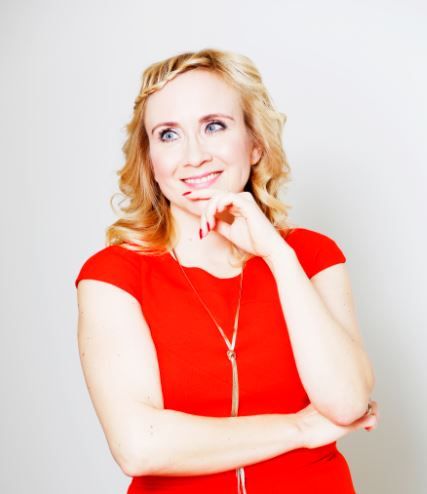
It is part of life to feel love, with all its changes and in all its shapes and forms. A living relationship is an evolution of love, and at times a revolution of love.
All these stages are part of love. Part of life.
With Love,
Your love coach Kati
Clinical Hypnotherapist, NLP Trainer
[email protected]
PS. Please share your comments and this blog post to your friends and family in social media, and leave your reader comments in Amazon Author page. Thank you for your help in spreading Love!

FREE EBOOK ‘I love you but…’ – To Break Up or Not to Break Up?
Refocus your energy now to improve your love life! This FREE ebook ‘I love you but…’ will help you move towards a better relationship or

(R)evolution for Love – The Book
* I have selected every editorial product for your benefit. Sometimes you may get some discounts and I may receive a share from purchases made
